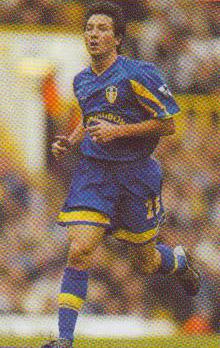

Burns: Jacob Geoffrey (Jacob)
2000-2003
(Player Details)
Midfield
Born: Sydney, Australia: 21-01-1978
Debut v Charlton Athletic (h): 14-10-2000
5’9” 10st 10lb (2002)
Burns was an accomplished Tennis Player but decided to concentrate on football. He was a
product of the Westfield Sports High School, which also produced Harry Kewell, Jamie
McMaster, Shane Cansdell-Sherriff and a host of other Australian International Footballers,
Cricketers, Swimmers and other Athletes. After playing Junior football with Greenacre,
Sydney Olympic and St George in New South Wales, he joined Sydney United in 1997, scoring
five goals in starting fifty-two games and making eight more appearances from the bench,
before moving to Parramatta Power in August 1999. He played twenty-five times, including one
as a substitute, and scored three goals before he was transferred to Leeds United for
£250,000 in August 2000. He had already made his debut for Australia at Under Twenty-Three
level and on joining Leeds gave up the chance to play for the Olyroos Olympic squad in 2000
to concentrate on making the grade at Elland Road. He was bought initially for future
potential and as cover in midfield and defence, but was soon pressed into service due to an
injury crisis at Elland Road. He played at home to Charlton Athletic, Liverpool, Real Madrid,
Barcelona, Lazio and away to Manchester United, Besiktas, Bradford City and Tranmere Rovers,
a true baptism of fire in under strength Leeds teams. It was back to the Reserves where he
featured regularly, except when injured, but did manage another two first team appearances at
home to Bolton Wanderers and away to Tottenham Hotspur, once again in United teams severely
depleted by injury. After a trial with Feyenoord, he was released at the end of his contract
in June 2003. Barnsley signed him in October 2003. He made his Barnsley debut at Wycombe
Wanderers in October 2003 and went on to score once in twenty-two League games, including six
from the bench, and played four times in the F.A. Cup that season. Again a regular in the side
throughout the 2004/2005 campaign, Burns turned into one of the Reds most consistent and
underrated players with a string of fine displays in midfield. He scored twice in thirty-four
League games, including one from the bench, and made one substitute appearance in the F.A. Cup
and also started one League Cup game. The Aussie netted three goals in the League from
thirty-two starts and one game from the bench, scored twice in the League Cup from one start
and one game from the bench, while he also made three starts and one game from the bench in
the F.A. Cup and was in fine form alongside Stephen McPhail during the run in. He left for
Polish Champions, Wisla Krakow, in March 2006 where he started promisingly and stayed until
the end of the 2007-08 season, making twenty-two appearances. He had made one more appearance
for them in the 2008-09 season, before he followed his former coach at Wisla, Dan Petrescu,
to Romania to play with Unirea Urziceni. In his time there he made nineteen appearances before
he decided the time was right to return home to Australia, signing with Perth Glory for the
start of the 2009-10 season on a three year contract and was appointed the Club Captain. His
International career with Australia has been long and chequered. After playing for the
Australian Under-Twenty-Three side he received his first call-up to the full International
team in 2000 for the game against Scotland, from the bench, and in 2001 against Columbia, which
was his last International appearance for several years. Although he was called up for the
Australian squad for the 2-0 loss to Kuwait in September 2006, he did not receive his third cap
until the game against Denmark in 2007, when he came on as a substitute. In the same year he
came off the bench to earn his fourth cap against China as Australia triumphed 2-0. He received
a late call up to the Australian squad against Nigeria as a replacement for Tim Cahill, and came
on at the start of the second half. He gained another cap in a friendly game against Ghana in
Sydney, where he started the match, and came off on the seventy-ninth minute. His next cap was
as a seventy-seventh minute substitute as Australia beat Holland in Eindhoven 2-1, with Harry
Kewell scoring from the spot and Josh Kennedy getting a second on 6th September 2008. On 10th
September 2008 Burns was called up to replace Jason Culina in the starting line-up to face
Uzbekistan in a World Cup Qualifier. Burns won the praise of Socceroos coach Pim Verbeek for
filling in for a virus-striken Culina at the last minute and performing admirably alongside Carl
Valeri in defensive midfield in the side's 1-0 win in Tashkent. He gained his tenth cap as a
second-half substitute in a 2-1 win over Japan in the World Cup qualifying tie on 17th June 2009,
and his eleventh came in a 1-0 win over Indonesia, in an Asian Cup qualifier in Brisbane in March
2010. He had a successful 2009-10 season with Perth Glory, playing twenty-four A-League games
and scoring two goals. He followed this up with another twenty-four in his second season with the
club in 2010-11. He retired on 5th April 2014 after playing one hundred and fourteen games for
Perth Glory. The Highlight of his Perth career was probably in defeat, as the Glory fought their way
to the 2011-12 Grand Final winning the semi-final on penalties with Burns scoring the final deciding
spot-kick. While the Glory went down to Brisbane Roar in the final, Burns was awarded the "Joe
Marston Medal" for the best player in that Final.